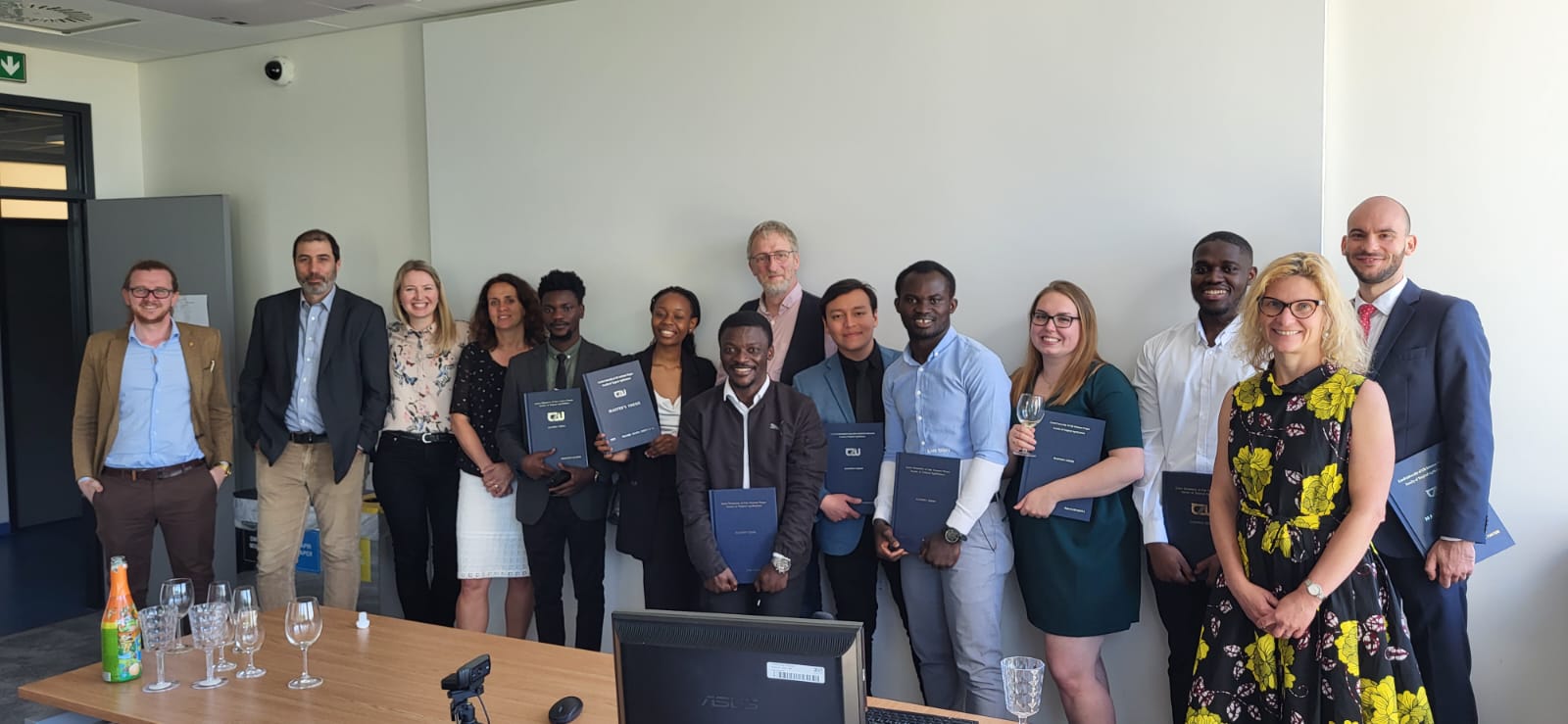This year, 5 master students from Biogas Research Team successfully defended their thesis.
Fiifi Aggrey-Sey was master student at the Biogas Research Team under the supervision of Associate Professor Dr. Hynek Roubík with his research focused on “Biogas in developing countries and the SDGs: Comparative cross-fuel analysis for biogas and other cooking sources in Central Ghana”.
His topic was aiming to investigate the use of small-scale biogas technology and its implementation benefits in terms of the socio-economic, environmental, health and climate impacts in relation to the SDGs among households in the rural areas of Central Ghana.
Thanks goes also to assoc. prof. Dinh Van Dung from Hue University of Agriculture and Forestry (Vietnam), who was reviewer and opponent of this thesis.
***
Peter Kwame Konadu was master student at the Biogas Research Team under the supervision of Associate Professor Dr. Hynek Roubík with his research focused on “Influencing factors for household decisions on adoption and use of biogas technology: Case of Ghana”.
His topic was aimed to investigate the factors that influence household decisions about the adoption and use of biogas technologies and the benefits of implementation in terms of socio-economic, environmental, health, and climate issues in relation among households in rural areas of the Offinso North district in the Ashanti region of Ghana.
Thanks goes also to Dr. Tatiana Nevzorova from RISE - Research Institutes of Sweden (Sweden), who was reviewer and opponent of this thesis.
***
Temitayo Oladeji was master student at the Biogas Research Team under the supervision of Associate Professor Dr. Hynek Roubík with his research focused on “Biogas production as a strategic way of urban waste management in Lagos, Nigeria: Case study of Olusun landfill”.
His topic was aimed to to examine biogas as a way of managing waste at Olusosun Landfill, Lagos and to evaluate the optimal technology of the production of biogas.
Thanks goes also to Dr. Olena Melnyk from ETH Zurich (Switzerland), who was reviewer and opponent of this thesis.
***
Opeyemi Oshundaro was master student at the Biogas Research Team under the supervision of Associate Professor Dr. Hynek Roubík with his research focused on “Biogas production as a strategic way of urban waste management in Lagos, Nigeria: Case study of Olusun landfill”.
this study examined vegetable and fruit waste as a source of biogas for energy generation. case of Ipokia, Nigeria. Specifically, the study evaluated the waste disposal and management methods available in the study area, understood the perception of the resident of the use and awareness of biogas from vegetable and fruit waste.
Thanks goes also to Dr. Iryna Vaskina from Sumy State University (Ukraine), who was reviewer and opponent of this thesis.
***
AbdulAzeez Shobajo was master student at the Biogas Research Team under the supervision of Associate Professor Dr. Hynek Roubík with his research focused on “The potential of sugarcane bagasse as a feedstock for biogas production in Nigeria”.
The aim of this study was to determine the challenges faced by sugarcane farmers in Nigeria, identify the barriers to the adoption of biogas technology in Nigeria, and determine the optimal conditions for the anaerobic digestion of sugarcane via two parallel batch anaerobic digestion (AD) experiments.
Thanks goes also to Dr. Iryna Ablieieva from Linköping University (Sweden), who was reviewer and opponent of this thesis.
During my studies, I had the incredible opportunity to delve into a topic that truly fascinates me: the potential of Sugarcane bagasse as a feedstock for biogas in Nigeria. By assessing the challenges faced by Sugarcane farmers, particularly in the southwest region of Nigeria, I presented sustainable solutions for waste management, environmental pollution, and global warming.
I also took practical steps towards implementing sustainable solutions. As part of my research, I successfully produced biogas, a green fuel, through the anaerobic biodegradation of sugarcane bagasse.
It is gratifying to align my research with the United Nations' Sustainable Development Goals (SDGs). Specifically, my work contributes to SDG 7: Affordable and Clean Energy, by promoting the use of biogas as a renewable energy source. Additionally, my research addresses SDG 12: Responsible Consumption and Production, by exploring innovative ways to repurpose agricultural waste.
I want to express my heartfelt gratitude to my parents and family, my professors, colleagues, and mentors for their guidance and support throughout this journey. Your wisdom and encouragement have been invaluable.
Ecosystems around the world, from the Amazon to the Antarctic, are on the verge of collapse owing to human encroachment and exploitation, pollution, water scarcity and the impacts of global warming.
The antecedents of covid-19, recent burning of the Amazon forest, landslides, droughts, glaciers are some of the challenges the Earth faces today, as a result of inadequate environmental management and sustainability.
There is need to communicate the urgency to act upon what we are continually learning about the Earth, before the ramifications of our actions become further catastrophic. It is imperative that global standards of living are progressed in a way that promotes harmony throughout the environmental and social realms, without compromising future needs.
I am excited about the positive impact my research can have on sustainable agriculture, waste management, and the fight against climate change. Together, let's work towards a greener and more sustainable future!" AbdulAzeez Shobajo
Congratulations to all of you!


